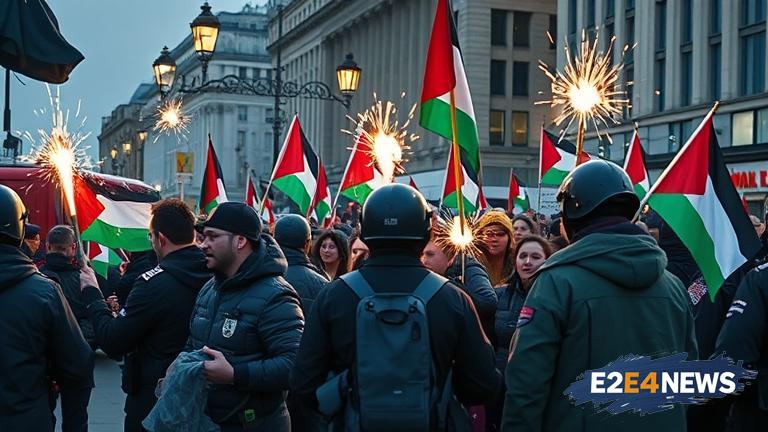A protest in London by Palestine Action, a group advocating for Palestinian rights, has resulted in arrests and ignited a heated debate about the Israeli-Palestinian conflict. The protest, which took place in the heart of London, aimed to raise awareness about the plight of Palestinians and to push for an end to Israeli occupation. The group, known for its direct action tactics, had been planning the protest for weeks, and it was expected to be a peaceful demonstration. However, things took a turn when police arrived on the scene and began to arrest protesters. The arrests were made under the suspicion of public order offenses, and those detained were taken into custody for further questioning. The protest was part of a larger campaign by Palestine Action to highlight the human rights abuses faced by Palestinians and to call for an end to the occupation. The group has been active in the UK for several years, using a range of tactics, including protests, boycotts, and direct action, to raise awareness and push for change. The Israeli-Palestinian conflict has been a longstanding and contentious issue, with both sides having deeply held beliefs and claims to the land. The conflict has resulted in the displacement of millions of Palestinians, as well as the loss of thousands of lives. The UK has a significant Palestinian diaspora community, and many Britons are actively engaged in the issue, with some advocating for Palestinian rights and others supporting Israel. The protest in London was just one of many that have taken place in recent years, with similar demonstrations happening in cities across the UK. The arrests made during the protest have sparked debate about the role of activism and the limits of free speech in the UK. Some have argued that the police overreacted and that the protesters were simply exercising their right to peaceful assembly. Others have claimed that the protest was a legitimate target for police action, given the potential for disruption and disorder. The incident has also raised questions about the UK’s relationship with Israel and the impact of the conflict on British foreign policy. The UK government has historically been a strong supporter of Israel, but in recent years, there has been growing pressure to take a more nuanced approach to the conflict. The Labour Party, in particular, has been vocal in its support for Palestinian rights, and there have been calls for the UK to recognize Palestine as a sovereign state. Despite the challenges and controversies surrounding the issue, the protest in London demonstrates the ongoing commitment of activists to raising awareness and pushing for change. The incident has also highlighted the need for a more informed and nuanced discussion about the Israeli-Palestinian conflict, one that takes into account the complexities and sensitivities of the issue. As the situation continues to unfold, it is likely that we will see further protests and demonstrations in the UK, as well as ongoing debate and discussion about the role of activism and the limits of free speech. The UK government will also face ongoing pressure to re-evaluate its relationship with Israel and to take a more proactive approach to resolving the conflict. Ultimately, the protest in London serves as a reminder of the power of activism and the importance of ongoing efforts to raise awareness and push for change. The Israeli-Palestinian conflict is a complex and deeply contentious issue, but by working together and engaging in respectful and informed dialogue, it is possible to create a more just and equitable future for all. The protest has sparked a wider conversation about the impact of the conflict on civilians, particularly children and women, and the need for a lasting and peaceful resolution. It has also highlighted the importance of international cooperation and diplomacy in resolving the conflict, and the need for the UK and other countries to play a more active role in promoting peace and stability in the region. The incident has also raised questions about the role of social media in activism and the impact of online campaigns on public opinion and policy. As the use of social media continues to grow and evolve, it is likely that we will see further innovation and experimentation in the use of online platforms for activism and advocacy. The protest in London is just one example of the many ways in which activists are using social media to raise awareness and mobilize support for their causes. By leveraging the power of social media, activists can reach a wider audience, build larger coalitions, and create more effective campaigns. The use of social media has also enabled activists to respond quickly and effectively to changing circumstances, and to adapt their tactics and strategies in response to new developments. As the situation continues to unfold, it is likely that we will see further innovation and experimentation in the use of social media for activism and advocacy, and a growing recognition of the importance of online platforms in shaping public opinion and policy.





